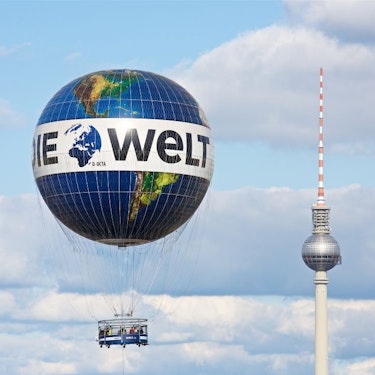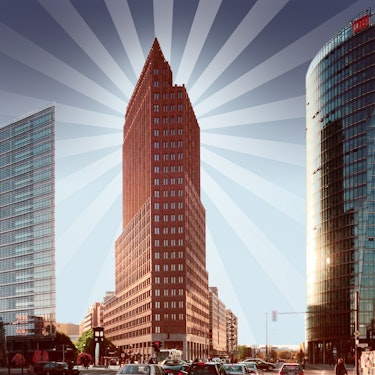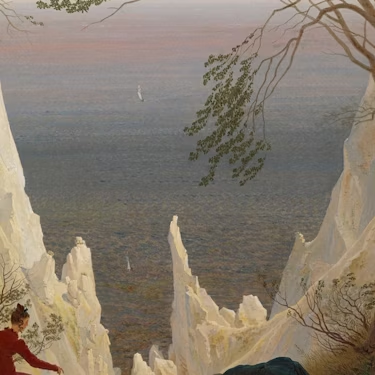More about: Berlin in 5 Days: tips, what to see, and much more
You visit Berlin and you have 5 days? At first it may seem few days to visit such a big city with so many attractions. However, well planned it is possible. That is why I have selected the best attractions of the city and I have organized them in a planning that will optimize your time to the maximum. You will get to know the city from an urban and artistic point of view, as well as its people. Are you up for it?
Day 1: Brandenburg Gate, Reichstag and Tiergarten

The first day is an introduction to the city. With this guide you will see what you can not miss on your trip to Berlin: contemplate the Brandenburg Gate. During this day we will stay in the area that delimits the Tiergarten to the west and to the east and north the Spree River. An area that has everything and that, well planned, can occupy a day.
Start at the Brandenburg Gate
Undoubtedly, the icon of Berlin and Germany. The Brandenburg Gate is a neoclassical building designed by the architect Carl Gotthard Langhans. If you book a guided tour of Berlin, this will surely be the meeting point.
The truth is that it is not a spectacular monument by itself (there are others much bigger and more beautiful), but it is difficult to surpass its iconic importance. Many of Germany's political events in the last century have had this monument as a reference point.
It is also a perfect way to get a first contact with the city. You will be able to take your best photos of Berlin while enjoying a busy and bustling urban area. Once you've had a good look around, we'll head north towards the Spree River.
Be dazzled by the Reichstag
A 5-minute walk from the Brandenburg Gate we find the Reichstag, the center of federal politics of the country. It is an imposing building of eclectic style typical of the nineteenth century but with a very modern glass dome. As you probably already know, the Reichstag was quite damaged by the fire suffered in the 30s, most likely caused by the Nazis.
The modern dome can be visited free of charge. Its opening hours are from 08:00 to 24:00 hours, although the last shift of visit is at 21:45. You must take into account that to access you have to register online. Normally you are asked for your name and surname, as well as an identification document.
If you decide to visit spontaneously, you may be given an appointment within the next two days. Therefore, my advice is to book a tour of the Reichstag. The entire tour can take around 2 hours.
Eat and relax in the Tiergarten
Right next to the Reichstag stretches the Tiergarten, one of the most spectacular Berlin parks. True green lung of the city, it consists of 210 hectares full of paths, gardens of all styles and a lake. I advise you to go there to spend the next 2 or 3 hours. There you can eat, either in some of its restaurants or also making a picnic with what you have been able to buy.
Then, nothing better than taking the food with a nice bike tour or, if the weather is nice, lying on the lawn. Definitely a great plan if you visit Berlin in June, when the weather is the best of the year.
Visit the Holocaust Memorial

Retracing your steps, just over 10 minutes walk from the Brandenburg Gate to the south, you will find the famous Holocaust Memorial. One of the most significant monuments in Berlin whose function is to remember the Jewish genocide during World War II. It is a huge urban extension populated by more than 2,000 concrete blocks.
Once you have done that, I advise you to end the day with a tour of the Third Reich in Berlin that is framed between the Tiergarten, the Spree River to the north and east and by one of the watercourses of the same river that extends to the south.
Visit Checkpoint Charlie
Checkpoint Charlie, a true testament to the Cold War, is worth a visit.
It is the recreation of the guardhouse located at the exit of the American sector of post-war Berlin. It is, as I say, a recreation, but if you have been left wanting to see the original, you can do so at the Allied Museum.
Don't miss Potsdamer Platz
Potsdamer Platz was one of the most vibrant spaces in Berlin until World War II.
After the devastation of the bombings, this area has regained its former splendor and has become one of the symbols of modern Berlin.
Its contemporary buildings, as well as its Sony Center, a large shopping complex, are some of its great attractions.
Immerse yourself in Markhaller Neun
If you prefer an immersion in the Berlin of the markets, it is a great idea to start at the Markhalle Neun, located in the same sector where we are moving. It is a historic market that has everything: sausages, meat, fish... and sweets!
If you are traveling with children do not hesitate to stop by the Naschmarkt, a candy market. It is held every 3 months, so I advise you to check on their website if it coincides with your visit. And, if dinner time is too late, no problem. You are in an area brimming with stores and restaurants, so you won't be short of options!
By the way, if for some reason you don't feel up to a walk, you can always book a sightseeing bus around Berlin. For a very affordable price they will show you everything there is to see with the utmost comfort - some of them even include the possibility of a cruise!
Day 2: Museum Island, Alexanderplatz, Berliner Fehrsehturm and Berlin Cathedral

You have already visited the must-see sights yesterday. Therefore, the second day will be dedicated to exploring the city little by little, stopping at the most beautiful places and letting time pass. You will visit Museum Island and cross the Spree River to the east, in an area dominated by some of the city's most significant urban spaces.
Start the day with culture on the Museum Island
There's nothing better than starting the day on Museum Island, a haven of peace and culture in the heart of Berlin. If you are a culture lover, you will love it. I show you everything you can enjoy in its space:
- Neues Museum: Another museum dedicated to antiquities, although with interesting collections of Egyptian art. In fact, it will be there where you can see the famous bust of Nefertiti. It opens between 10:00 and 18:00 hours and the entrance is on sale from 12 €.
- Museum Bode: A museum that houses authentic wonders such as numismatic collections, medieval objects and even from the Byzantine Empire. It also opens between 10:00 and 18:00 hours and you can buy the ticket from 12 €.
These are the museums I recommend you to visit. There are others, such as, for example, the National Gallery that, being very interesting, may be better left for another visit to Berlin. The artistic wonders can be found in the ones I have just highlighted. Keep in mind that they are very large museums and visiting them can take you a long time. Regarding tickets, you can get an overview in this article about everything you need to know about tickets for the Museum Island.
Stroll around Alexanderplatz and Berliner Fernsehturm
Once you've received your dose of art, I advise you to complement the morning with a little bit of wandering. It is best to head east and cross the river, heading to Alexanderplatz and the Berliner Fernsehturm, the TV Tower.
The Alexanderplatz is an urban space that during the nineteenth century and part of the twentieth century was one of the most important places in the historical events of the capital. After World War II it was completely destroyed, so today it is populated by modern monuments.
Among them is the Berliner Fernsehturm, although it is not in the same square, but very close. You can book tickets to the Berlin TV Tower from 28 €. If your visit to the Museum Island has been short and you arrive around lunchtime, you can do it in its restaurant. In the Sphere Restaurant, you can enjoy great views of Berlin, although I advise you to book in advance.
Visit the Berlin Cathedral

If you still have a few hours to spare before dinner, you can't leave without seeing the nearby Berlin Cathedral: a colossal 19th century eclectic monument that is probably one of the largest Lutheran churches in Europe.
You can visit it between 9 am and 8 pm. I advise you not to miss the Crypt of the Hohenzollern, the Prussian dynasty par excellence, architect of modern Germany. Admission is available from 7 €. Is there a better way to end the day?
Day 3: Kreuzberg and Berlin's nightlife

So far you have explored the more "German" Berlin, the one that shows the historical and cultural heritage of Germany. On this third day you will get to know the more modern Berlin, the one that reflects the country's history of the last decades. Or in other words: the multicultural and cosmopolitan Germany. You will finish the day with an evening itinerary to enjoy the legendary nightlife of the German capital.
Immerse yourself in the Kreuzberg district and its alternative atmosphere
The Kreuzberg district began as a working class neighborhood that, over time, was home to the numerous Turkish immigration received by Germany in the second half of the twentieth century. Today it is a totally multicultural and very alternative neighborhood whose street life is more than intense.
There are many attractions to enjoy, but you can not miss the Turkish market. It takes place on Tuesdays and Thursdays and is an unbeatable opportunity to try Turkish specialties such as falafel. But also of fresh products that will sell you in its many food stalls. If you visit Kreuzberg on another day, it doesn't matter, you can replace the Turkish market there with one of the many kebab stores. A 100% authentic immersion.
You can complement your visit by passing by the Köpi Okupa Cultural Center, one of the pioneering places in the squatting movement in the 80s, which today survives as an alternative cultural center, with exhibitions and even live punk concerts. Anyway, if you want more ideas, here I leave you an article about Things to Do in Kreuzberg.
Take a break at the Landwehrkanal
After lunch, you can take a break at the Landwehrkanal, a space of about 10 km along the Spree River. Once you have regained your strength, I advise you to book a tour of Berlin's Jewish quarter and pay a visit to the Berlin Jewish Museum. Its building, designed by Daniel Libeskind, is one of the emblematic buildings of Berlin.
Its exterior also highlights the so-called Garden of Exile. Here you can see 49 concrete pillars in tribute to the founding of the State of Israel. This museum, considered **one of the largest Jewish museums in Europe **, houses inside documents and objects related to the history of German Jews in recent centuries. It also has an archive and library. It is open from 10 am to 7 pm and you can buy a ticket from 8 €.
After visiting it, it will be time to find a place to have dinner and recharge your batteries for what awaits you: a good nightlife in Berlin.
Experience the Berlin party
You have three options. The first one, advisable if you really liked the atmosphere of Kreuzberg or you are not 100% ready to move to other areas of Berlin. Since Kreuzberg is a very dynamic neighborhood , there is no lack of party options. It is also home to some of the most famous clubs in the city. These are some of the most famous places:
- Watergate: Especially recommended if you are a lover of electronic music.
- Wild At Heart: A place for rockers.
- Rautschgold: Ideal for the eighties and those looking for a gay atmosphere.
The second option I mentioned above is to go all out and visit some of the busiest and most famous clubs in the city. If this is your intention, take note of the most recommended places:
- Berghain: One of the temples of electronic music with a strong gay and sexual diversity atmosphere. It is located in the Fredrichshain area.
- Tresor: A return to the origins for techno lovers, since it was one of the first nightclubs to specialize in this musical style. It is located in the Mitte area (the most central of Berlin).
- House of Weekend: A recommendable place if you want to party but with certain moderation. In this place, located near Alexandeplatz, you can enjoy quiet moments on its terrace with great views of the city.
And another of my favorites: book a beer tour in Berlin. Here is more information about what to do in Berlin at night. Whatever you do, it will be intense - tomorrow is another day!
Day 4: a day "de tranquis" with a visit to the Berlin Wall
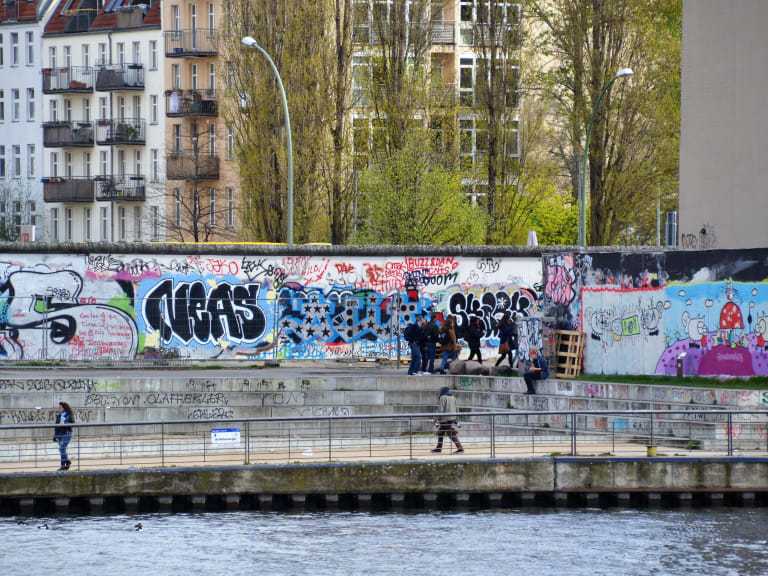
Good morning, too much hangover? No problem, it's foreseen. You're on day 4 and you've seen quite a bit of Berlin. The basics, so to speak. But one of the most important is missing: the Berlin Wall. However, you can sleep on, you're going to devote the afternoon to it. But if you feel like getting out of bed, we can go look for a place to eat.
Meet the East Gallery of the Berlin Wall
As you know, the Berlin Wall was built in the 60s at the initiative of the communist government, largely to prevent the flow of citizens from East Berlin to West Berlin. Originally, the facility consisted of the wall itself and additional walls, as well as areas of barbed wire fences. Today, sections of the walls remain and can be visited on a pleasant walk.
I recommend that you book a tour of East Berlin and visit the so-called East Gallery, where you can see some of the best-known graffiti. For example, the famous mural of the passionate kiss that Brezhnev and Honecker, the president of the German Democratic Republic, gave each other.
You can make the visit in two ways. One, in the form of a pleasant walk to where you feel like it and another by hiring one of the many guided tours, both on foot and by bicycle that will take you into the history of this building and what was the painful separation between Berliners (and Germans) for almost 40 years. If you want more information about it, here is an article about the best guided tours in Berlin.
Complement your visit to the Berlin Wall with a visit to some museums
If you are interested in history or want to learn more about the evolution of the two blocks of the Cold War, nothing better than booking tickets for the Wall Museum, a place where you can delve into the history of East and West Berlin, as well as the vicissitudes of its fall or the events that took place there (for example, the famous speech of Kennedy).
It is organized in a very didactic way in 13 thematic rooms. You can visit it from 11 € between 10 am and 7 pm.
Eat some typical German food
If you want to try some typical German food, you can go to the Maximilians Restaurant, located in Friedrichstrasse, right in the center and not far from Checkpoint Charlie. The focus of this restaurant is Bavarian food: the Bavarian culture is not exactly the Berlin one... but it is undoubtedly 100% German! You will see it in the furniture and decoration but also in the Bavarian attire of the staff.
A real paradise for eating sausages, but they also serve hamburgers and all kinds of meats. You can also take advantage of the menu of the day, which is served between 11:30 am and 2 pm. The best thing is that it is not an excessively expensive place, since you can eat from 10 €.
Another option to get to know Berlin's culinary culture is to book a gastronomic tour of Berlin.
End the day shopping
The day has been intense, so why not relax a little by going shopping? Just a 15-minute walk from the Wal Museum is the East Side Mall, a shopping mall where you can browse the stores or just go shopping.
And, if you still have the energy, you can take a stroll through the surrounding area, which used to be part of East Berlin. For a long time, this part of the city has been considered the least interesting. However, it has recently been revalued for its touristic interest. If you like history you will enjoy it as you will find its traces in the homogeneous architecture so characteristic of the communist bloc in the Cold War.
Dine on local and sustainable food
As you probably already know, Germany is a pioneer in environmentalism and sustainability; in fact, it is nowadays one of the main European consumers of organic products.
This environmental concern has led to the emergence of "farm-to-table" restaurants in Berlin. If you want to take the opportunity to enjoy these spaces, I advise you to grab a bite to eat at Lokal. In addition to sustainable and organic food you can also contemplate its space, decorated with furniture and objects made with wood from the forests near Berlin.
Lokal is open from 17 to 24 hours, although if you want to dine, it is best to book in advance. The prices, I won't deceive you, are not cheap, although they are by no means outrageous. You can eat from 20 € or 30 €. In addition, its central location in Mitte is very likely to be on your way back to the hotel.
Day 5: Get away from it all and end the day visiting a special neighborhood
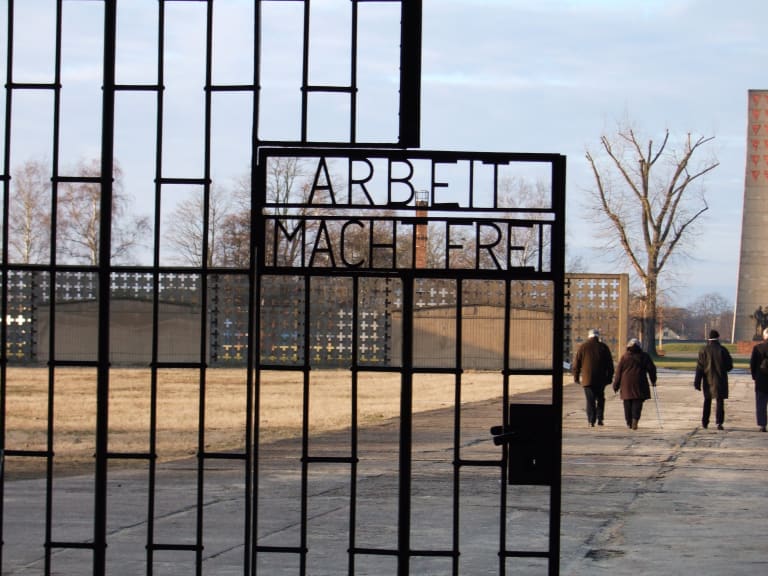
It's your fifth day in Berlin, you've already seen the essentials even in some depth and without rushing, so why not take a trip somewhere interesting in Berlin? It's a done deal. Take advantage of your last day to disconnect a bit from the German capital.
Take a trip to the Sachsenhausen concentration camp
I advise you to book an excursion to Sachsenhausen. It is located just 50 minutes drive from the city, so you can visit it in a few hours. It is, as its name suggests, a concentration camp, not an extermination camp, although what you will see there will also leave you impressed. It basically consists of barracks, punishment cells and infirmary premises. It was used by 60,000 inmates, although its history did not end with the end of World War II, since it was later used by the Soviets.
Admission is free, but if you want an audio guide (something I recommend), you can buy them from 3 €. To optimize your visit I recommend you to define well the way to get to Sachsenhausen. Here is all the information you will need about how to get to Berlin from Sachsenhausen.
To estimate the time it will take you, consider that on average it takes 3 hours to visit Sachsenhausen. Add to that a little over an hour and a half each way. If you leave in the morning, you will still be able to enjoy more of Berlin in the afternoon. Sachsenhausen is open from 8:30 am to 6 pm, so if you go early, you will have the whole afternoon to yourself.
End the day by seeing a Berlin neighborhood
You have practically the whole afternoon to complement your visit to Berlin with a neighborhood that you have not been able to explore so far, because Berlin is huge! I suggest two neighborhoods, each with its own unique attractions. It is up to you to choose the one that interests you the most.
- Charlottenburg: An area with a lot of eighteenth-century charm, since it was developed in the heat of the rise of the Prussian kings. Charlottenburg Palace is a good example of this history. Here you have all the information about how to visit Charlottenburg Palace.
- The Jewish Quarter: Located north of Alexanderplatz, it is of great interest especially for its Jewish Cemetery and the New Synagogue. Do you want more information? In this guide on what to see and do in Berlin's Jewish Quarter you will find all the information you need.
And your exploration of Berlin is almost over. Only 5 days but it has been a lot. As always, you will have left some little things to discover or some streets to explore. That's why we're sure you'll want to come back.
Is the five-day Berlin Pass worth it?

The million dollar question. The Berlin Pass is specially designed for visits of 2 or more days in Berlin to enjoy all there is to see and do in Berlin. The Berlin Pass is especially suitable for planning an intense exploration of the city, with many visits to museums and other paid sites. It also includes all the transportation you can use for 2 or 3 days (the two types of pass that exist) by subway, streetcar and bus. Even a boat cruise.
So it all depends on what you want to do. If your idea is to spend every day visiting places that require a ticket, then I recommend it: up to 60 places are included in the Berlin Pass. However, if your idea is to dedicate 1 day to culture, it might not be worth it. Especially because a 2-day Berlin Pass can be purchased from 100 € and a 3-day pass from 130 €. It is not, therefore, cheap.
My advice is to make your planning first and then do the math. To help you do it let me share with you this article about everything you need to know about the Berlin Pass.

